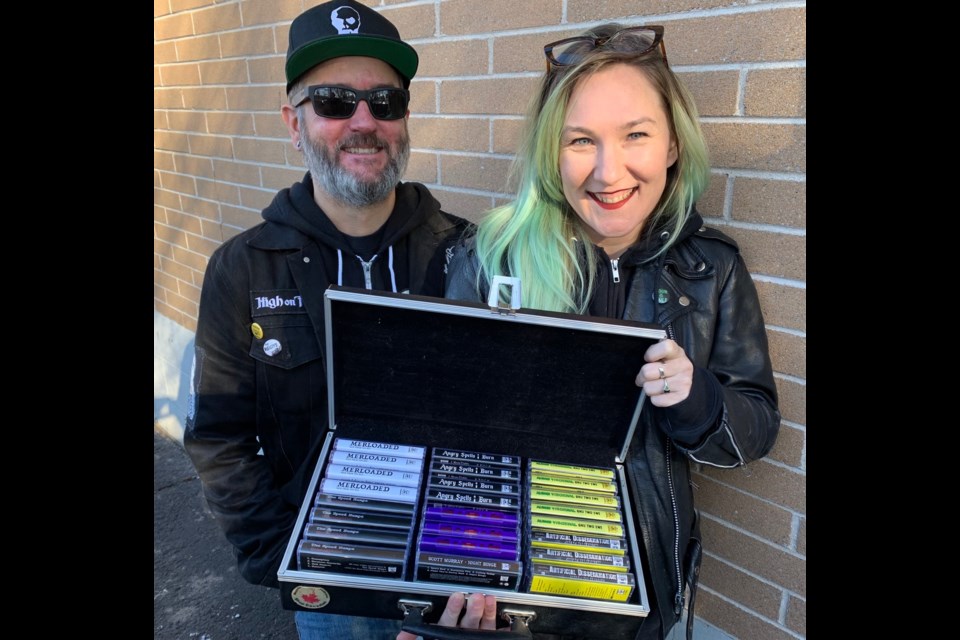They’re back!
Or maybe they never even really left.
For almost 60 years, cassette tapes have been one of the formats music fans — and musicians — have used to hear their favourite tunes.
Now a Barrie company is helping punk bands — who may or may not have had their music previously released on CDs and/or vinyl — spread the word about their music in a format invented the same year Ringo Starr joined The Beatles.
Tarantula Tapes, a cassette tape-only record label that started up near the end of summer 2020, is the brainchild of Casey Cuff and partner Core (pronounced Kor-Ree) Bee.
While they both work full-time, they are also musicians and recent events over the last 10 months (Hmmm, what could that be?) and some extra spare time helped spawn the idea of creating cassettes for their fellow punk musicians.
“Obviously, (playing live gigs) was squashed pretty quickly because of COVID,” Cuff says. “Not playing shows and having a lot of friends in the music scene, we were all pretty bummed we couldn’t be supporting that scene.
“We’d been getting into cassettes a lot lately and we just thought it would be great to put out all this music we love and make cassettes,” she adds. “It felt like the right time because it was another way to support the community and get our music out there and our friends’ music out there. Cassettes are a pretty good medium. They’re low-cost to make and they’re not too expensive to buy.”
“Vinyl is a pretty easy sell,” says Core Bee. “But it is pricey for a band to get vinyl made. You’re looking at around $3,000 to get not too many of them made, and CDs don’t really sell any more.
“People like cassettes because they’re different. They are gaining in popularity again,” he adds. “I remember a couple of years ago I started to see some of them pop up and scratched my head and said, ‘Really? Why would anyone want to do that?’
“It’s almost like what happened with vinyl 10 or 15 years ago is now happening with cassettes.”
Much longer ago than that, Philips invented the cassette medium in 1962 for audio storage, introducing it in Europe in 1963 and in the United States the following year (under the Norelco brand) with the trademark name 'Compact Cassette'.
Fast forward to 2021 and Tarantula’s myriad of cassette punk bands would seem like something from another galaxy to the folks at Philips.
“It’s definitely punk and similar genres,” Cuff says of their clientele. “That’s what we’re into and that’s what we gravitate toward; it’s an audience we’re familiar with. We probably wouldn’t do indie or pop or something like that.”
She and Core Bee are certainly no strangers to the punk scene. Both are members of the bands The Speed Humps and Heavy Petter. Cuff is also in Angry Spells, and Bee has a solo project.
The bands that utilize Tarantula Tapes have, for the most part, gone into studios to record, he says.
“These (cassettes) are their proper albums or EPs that they’ve released through Spotify and iTunes, so cassettes are another alternative form for them. Surprisingly, there’s quite a large community (of cassette enthusiasts) out there in the world,” he adds. “We’ve shipped a bunch of tapes off to the States and various places throughout Canada.
“For lot of bands who have already done digital or physical releases, this gives them another way of getting it out there. We include a download code with every cassette, so everyone is always able to download a copy or just stream them online.”
All the tapes are manufactured locally, complete with cassette cover artwork.
“We do three-panel ‘J’ cards,” Cuff says of the audio cassette covers. “Basically, we will reformat their album artwork for the cassette format. They can choose their colour. And they can design artwork for the label on the cassette. The labels are vinyl stickers; they stick on really well, they look really sharp, and the colour reproduction is great.”
While the business may be small for now, Tarantula is big on quality, says Bee.
“We are focused on doing this in a very high-quality way. We get our equipment regularly serviced, we have tone tapes to make sure the speed is correct. We make a master type directly from a digital source,” he says. “As we’re doing the duplication process, we’ll check random samples every now and then to make sure the quality is there.
“We record everything on normal bias tape. It’s obviously not exactly like digital,” Bee says. “Vinyl has its own certain characteristics. There’s just a unique sound to it. And cassette has the same thing. It’s magnetic tape and has a certain sound.
"There are certain frequencies that it just doesn’t reproduce that well,” he concedes, “especially the high-end stuff like high-hats and cymbals.”
“Without bands even playing shows right now we’re doing pretty well, considering we’re brand new and only selling online,” Bee adds. “I’m hoping when the live shows resume that this is only going to continue to grow.”
For more information on the label and its releases, click here.



